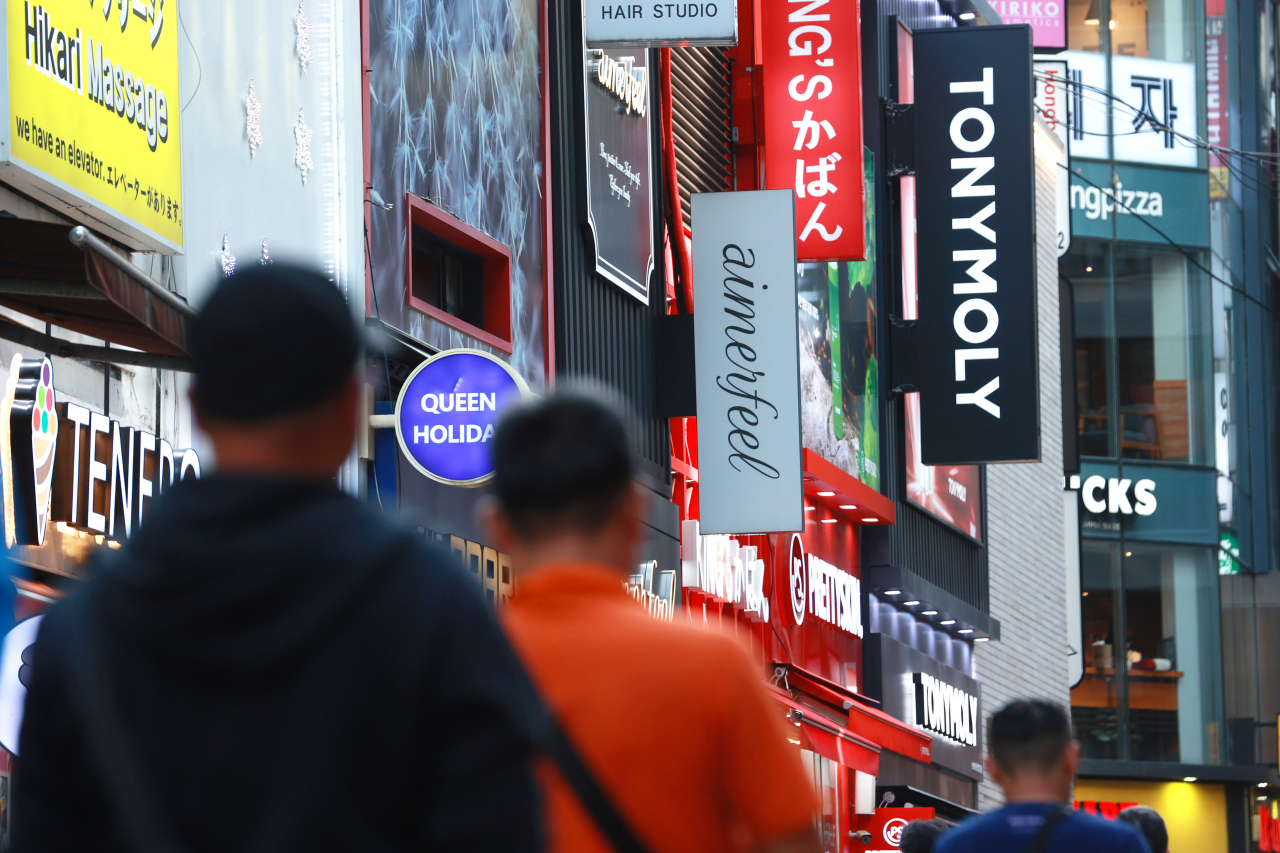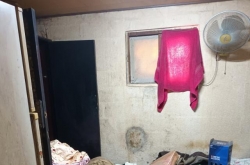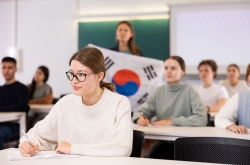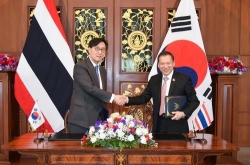 |
Pedestrians walk along an alleyway in Myeong-dong shopping district in central Seoul on Oct. 9. (Yonhap) |
South Korea and Thailand are to jointly address the growing number of undocumented residents of Thai nationality here in response to complaints of some regular Thai travelers being denied entry to Korea.
Seoul's Foreign Ministry said in a statement Saturday that First Vice Minister Chang Ho-jin proposed holding a bilateral consular strategic meeting with Thailand to discuss "issues related to Thais' visa status in and entry into Korea," without elaborating on the timeframe.
The proposal came during Chang's annual meeting with Thailand's Permanent Secretary of Foreign Affairs Sarun Charoensuwan in Bangkok, Thailand, Friday.
Chang was quoted as saying by the Thai local media that Seoul had already introduced measures to tackle a surge in the number of Thais living in South Korea illegally, including granting amnesty to illegal workers if they leave voluntarily. He added that the country currently has an annual quota for 4,800 Thai laborers to come to work in Korea.
A string of social media posts about experiences of being denied entry to Korea and deported -- despite proof of accommodation and a return ticket -- prompted a backlash over the past week. Thai Prime Minister Srettha Thavisin earlier Tuesday vowed to look into the issue.
The Justice Ministry, in charge of immigration affairs, said in a statement Friday that it would pay close attention to make sure that no innocent visitors to Korea fall victim to the strict immigration screening process.
The ministry said, however, that the current screening measures were necessary to prevent people entering Korea to work illegally.
The government said it could not arbitrarily ease regulations for Thai nationals because it had to maintain fairness toward foreign nationals who legally stay in Korea.
"The strict regulating of overstaying visas is a matter of national interest and sovereignty," the ministry said.
Thais have made up the largest share of people illegally living in Korea since 2016. There were 157,000 Thais living in Korea without a proper visa as of September, accounting for 36.6 percent of the total, according to the Justice Ministry. The Thai figure rose threefold over the past eight years.
The government data also suggested that nearly 80 percent of Thais in Korea do not have permission to be here.
The Bangkok Post cited Thai Labor Ministry estimates that about 93,000 Thai workers had obtained valid work visas through the Employment Permit Scheme, but September data from South Korea's Justice Ministry showed only 26,000 Thais here on the relevant visa.
This data is in contrast to overall immigration statistics, which show that of about 2.5 million foreign nationals in South Korea, about 17 percent are here illegally. More than two-thirds of the 220,000-strong increase in illegal residents in South Korea entered on tourist visas.
The number of Thai undocumented residents rose along with a rise in Thai drug offenders in the country, as President Yoon Suk Yeol launched a war on drugs in April.
According to police data compiled by Rep. Jeon Bong-min of the ruling People Power Party, the number of Thai nationals arrested for drug-related crimes surged fourfold from 189 in 2018 to 812 in 2022. Of the total of 6,585 foreign nationals arrested for drug offenses from 2018 to 2022, Thais accounted for about 45 percent.
"Visa overstays could result in the distortion of the labor market here and narcotic-related crimes, jeopardizing the security of Koreans' livelihood," argued the Justice Ministry. "Taking necessary measures to prevent illegal stays ... is obviously within the government's responsibility."
The Justice Ministry also noted that it had shared information about Thai nationals illegally working or residing in Korea with Thailand's Labor Ministry since 2019, when the two signed a memorandum of understanding. It also called on the Thai Embassy here in January and September to help reduce the number of Thais living illegally in Korea.
The Thai government has admitted to what they call the "little ghost" problem. Pairot Chotikasathien, permanent secretary of the Ministry of Labor, reportedly admitted Saturday that some Thai people fail to return to Thailand after traveling to Korea as tourists, as students or as customers of plastic surgery clinics, and there are Thais who visit Korea with valid work visas but refuse to return after their permits expire.
But some argue that there are Korean regulations that are fuelling the problem.
Rep. An Min-suk of the opposition Democratic Party said last month that the strict visa rules imposed on foreign students -- such as the upper limit on the time they are allowed to work -- lead them to resort to unauthorized employment. The number of students caught working illegally doubled in a year to 950 in 2022, he added.
According to the Korean Tourism Organization, 269,347 Thai visitors were estimated to have arrived in Korea, during the January-September period this year. That was down by a third from 2019's 399,884 over the cited period, when the annual Thai visitors hit an all-time high.










